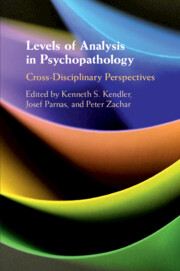Book contents
- Levels of Analysis in Psychopathology
- Advance Praise for Levels of Analysis in Psychopathology
- Levels of Analysis in Psychopathology
- Copyright page
- Contents
- Figures
- Tables
- Contributors
- Preface
- General Introduction
- Part I Neuroscience, Mechanisms, and RDoC
- Part II Phenomenology, Biological Psychology, and the Mind–Body Problem
- Part III Taxonomy, Integration, and Multiple Levels of Explanation
- Section 8
- Section 9
- Section 10
- Section 11
- Section 12
- 34 Introduction
- 35 Levels: What Are They and What Are They Good For?
- 36 Levels of Analysis in Alzheimer’s Disease Research
- Section 13
- Section 14
- Section 15
- Index
- References
35 - Levels: What Are They and What Are They Good For?
from Section 12
Published online by Cambridge University Press: 02 April 2020
- Levels of Analysis in Psychopathology
- Advance Praise for Levels of Analysis in Psychopathology
- Levels of Analysis in Psychopathology
- Copyright page
- Contents
- Figures
- Tables
- Contributors
- Preface
- General Introduction
- Part I Neuroscience, Mechanisms, and RDoC
- Part II Phenomenology, Biological Psychology, and the Mind–Body Problem
- Part III Taxonomy, Integration, and Multiple Levels of Explanation
- Section 8
- Section 9
- Section 10
- Section 11
- Section 12
- 34 Introduction
- 35 Levels: What Are They and What Are They Good For?
- 36 Levels of Analysis in Alzheimer’s Disease Research
- Section 13
- Section 14
- Section 15
- Index
- References
Summary
This chapter explores some issues having to do with levels in psychiatry and elsewhere in science. I distinguish among several different notions of level and discuss why talk of levels is sometimes useful in science, although it can also be a source of considerable confusion. I defend the claim that it is legitimate to think in terms of causal relations between levels (including so-called downward causation from upper to lower levels) against several recent criticisms, providing scientific example of when this motion seems appropriate.
- Type
- Chapter
- Information
- Levels of Analysis in PsychopathologyCross-Disciplinary Perspectives, pp. 424 - 449Publisher: Cambridge University PressPrint publication year: 2020
References
- 11
- Cited by

